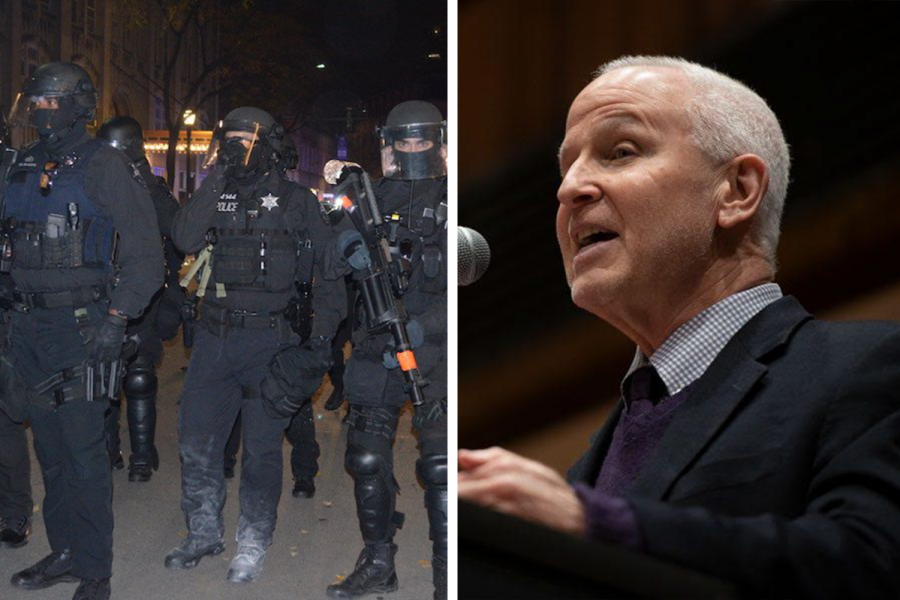NUCNC, central administration meet publicly for first time
Daily file photos by Binah Schatsky and Amy Li
Police officers responding to a protest (left) and President Morton Schapiro. Schapiro and other administrators responded to police presence at student protests at a Tuesday live webinar with NU Community Not Cops.
January 12, 2021
In their first public interaction with University President Morton Schapiro and other members of the central administration, NU Community Not Cops organizers expressed their disapproval of the University’s response to police abolition demands on Tuesday.
Five members of NUCNC met with Schapiro, Provost Kathleen Hagerty, Vice President of Student Affairs Julie Payne-Kirchmeier, Senior Vice President for Business and Finance Craig Johnson and Community Safety Advisory Board chair Clyde Yancy. The students steered the meeting, asking administration to respond to a series of questions, including several prompts they said they sent to administration in advance.
“We understand that you would like for this meeting to be a dialogue,” organizer Liz Curtis said. “However we would like for all of you to understand that you lost that privilege months ago. You had ample time to reach out to us since we sent our petition letter to you 223 days ago. None of you have done so.”
In their questions, the students cited their experiences from the past few months of protest, and asked for “yes” or “no” responses and for specific examples of changes being made.
Members of the administration, in response, repeatedly challenged claims the students made and largely avoided concrete answers.
The students confronted Schapiro about the harsh language in his Oct. 19 email. While Schapiro did walk back some of the language in the email — prompting student, faculty and staff backlash — he stood by his official condemnation of protest behavior he said “crossed the line into violence and intimidation.”
Schapiro rejected students’ claims that the administration had been inaccessible and non-responsive to student organizing, calling these assertions a “false narrative.”
In the first half of the meeting, students asked central administration to respond to the demands in the June 3 petition, including divesting from affiliated policing and re-directing those funds to “life-giving institutions” that support Black students.
Payne-Kirchmeier responded with a lengthy list of ways the University has responded to the “life-giving” demands, including their commitment to the Black House renovation and improvements in admissions and hiring practices over the last few decades.
When asked how the University is addressing the divestment demands, Schapiro replied “there have been a number of things in repurposing the police, from transports to safety checks,” without elaborating or offering specifics.
In the second half of the meeting, students referenced the repeatedly escalated behavior of the officers from the Northern Illinois Police Alarm System, an Illinois crowd control force that has been called in by the Evanston Police Department to manage protest activity. NIPAS have had repeated physical altercations with students, released chemical ammunition and performed one arrest.
Several screenshots were recently released via the Freedom of Information Act of an officer group chat in which officers used violent language. In one message an officer said “my trigger finger was jittering.” Another called the student activists a hate group and one officer discussed their deployment of chemical ammunition, writing “We will eat their food and then cover them in pava. Kidding…”
“Your students were beat, sprayed and arrested and we did not receive any form of communication from you,” student organizer Sarah Peko-Spicer said. “Where were the leadership notes when your students were being brutalized?”
Schapiro responded citing claims of aggravated protest behavior, as filed in an EPD police report following the Oct. 31 protest. But those claims have been widely disputed. While students did engage in vandalism, claims of bricks being thrown remain unverified. Protesters also did use lasers and firecrackers, but the EPD report implied they were intended to maim officers while protestors said they were used primarily for distraction.
The students closed the meeting by expressing disappointment and frustration at the lack of action and support from the administration. Peko-Spicer closed the meeting with an address, mainly directed at Schapiro.
“Morty, you wrote an Op-Ed in the Washington Post a few years ago in which you noted that students cannot learn in an environment in which they do not feel safe,” She said. “Let us be perfectly clear: we do not feel safe at this University.”
Email: [email protected]
Twitter: @binahschatsky
RELATED STORIES:
— Administration does not commit to defunding UP in Community Dialogue
— President Schapiro stands by controversial email condemning protesters in Community Dialogue
— Disarm, defund, disband: Students are marching every day until Northwestern abolishes NUPD


